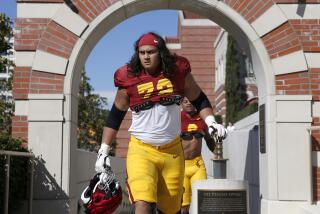Football, One Season at a Time : Education: Willie Jackson is learning disabled, but Pierce College will let him play as long as he’s eligible.
- Share via
Willie Jackson, whose quest to play college football seemed blunted because he has a severe learning disability, has been guaranteed at least one season.
Jackson, a senior at Taft High in Woodland Hills, has enrolled at nearby Pierce College in a spring football class, a one-unit physical education class open to Pierce students and high school seniors. In addition, Pierce has accepted Jackson’s application for enrollment in the fall and has promised to provide him a schedule of classes that will grant him at least one season of eligibility.
Under state rules, a student-athlete must carry at least 12 units in the fall semester of his freshman year to gain athletic eligibility, but it remains unclear what academic load Jackson will have.
The 6-foot-4, 235-pound defensive end has had little trouble on the football field since enrolling in the spring class last month. He can bench press 450 pounds and has the speed and skills to compete at the junior college level. But the learning disability has thwarted his academic progress. He reads at the third-grade level and struggles with elementary tasks that most adults take for granted.
He will participate in Taft’s graduation exercises next month but will not receive a diploma. Instead, he will be granted a letter of recommendation attesting to his work habits and attendance in high school. A high school diploma is not required for admittance to California junior colleges.
Jackson, a popular student at Taft, has impressed teachers, coaches and classmates with his earnestness and congenial nature and has made a similar impression at Pierce.
Robert Garber, an assistant dean at the school, agreed to accept Jackson’s application after meeting him and his mother and twice conferring with Jackson’s teachers and counselors at Taft.
“This is a touching and sensitive situation, and we really want to do the best we can for Willie,” Garber said. “We have a reputation in the community as an academic institution, and we want to balance that (with Jackson’s enrollment).”
Pierce had considered petitioning the state in an attempt to gain athletic eligibility for Jackson under a plan in which he would augment his Pierce curriculum with classes at West Valley Occupational Center, across the street from Pierce. The plan was scrapped, however, because most courses at West Valley, which are short-term and intensive, are incompatible with Pierce’s schedule and require reading skills beyond Jackson’s abilities.
Like many community colleges in Southern California, Pierce has an extensive program for learning disabled students, but the program is designed for those in the mainstream student population. Jackson attends a “school within a school” at Taft where he receives one-on-one attention. Pierce is unable to provide that kind of program, and even the school’s vocational education classes require students to read at the sixth- and seventh-grade levels.
“We’ll give him an opportunity to play football, but we can’t provide a program that is going to transform his life,” Garber said. “I don’t think there’s a class on campus outside the physical education department that he can profit from or be successful in.”
Garber said Pierce will deal with Jackson’s enrollment one semester at a time.
At least one academic professional forecasts a brighter future for Jackson. Drew Yellen, a sports psychologist in Granada Hills who specializes in treating athletes with learning disabilities, completed a series of tests on Jackson this month that confirms a diagnosis that appears on Jackson’s grade-school record. The tests show that Jackson suffers from aphasia, a language-communication disorder that hinders his ability to receive and express information verbally.
However, the tests also show that in nonverbal areas, Jackson has normal intelligence with adequate memory potential, according to Yellen. Jackson works diligently without getting frustrated and has a well-developed sense of humor, according to the tests.
Yellen, who has volunteered to treat Jackson clinically free, has concluded that in the right setting Jackson could succeed academically in junior college.
“Because of the language problem, he’s fallen way behind, and he has to play catch-up as rapidly as possible,” Yellen said. “The memory is there and the potential for retaining information is there.
“It’s also clear that he will persevere. He does not frustrate. I think college is worth a shot for him. I’m not willing to say that all he can handle is a nightwatchman’s job and that’s it forever.”
Yellen recommended personalized instruction for Jackson, but the Jackson family would be responsible for the cost, estimated at $30,000 to $50,000 a year. The Jacksons’ sole source of income is Social Security insurance.
Jackson has needed little assistance on the football field, much to the pleasure and surprise of Bill Norton, Pierce’s first-year coach.
Norton sent Jackson a letter announcing the start of spring practice, as he had to other high school seniors Pierce recruited. Because of Jackson’s limitations--he doesn’t have a driver’s license--Norton was unsure whether Jackson would attend spring practice.
“I was concerned whether he could get here himself,” Norton said. “I wondered, ‘How bad off is this guy?’ ”
Jackson was on spring break from Taft when practice began, but found his way to Pierce’s first workout, albeit a few minutes late.
“I asked him how come he was late, and he told me he had to take the bus to get here,” Norton said. “Guys are missing practice with cheap excuses, and this guy was willing to take the bus to get here. That put tears in my eyes. When I heard that, I knew I wanted him on our team.”
More to Read
Get our high school sports newsletter
Prep Rally is devoted to the SoCal high school sports experience, bringing you scores, stories and a behind-the-scenes look at what makes prep sports so popular.
You may occasionally receive promotional content from the Los Angeles Times.






